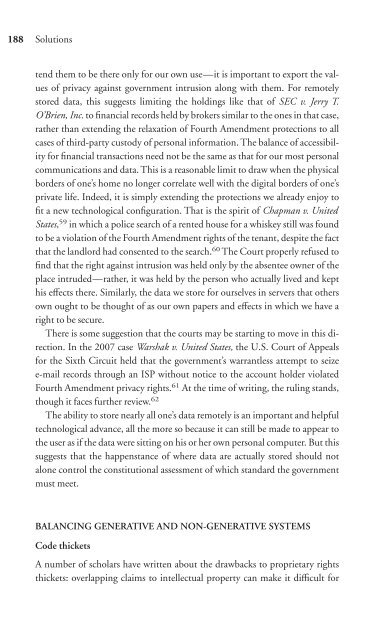Download - Future of the Internet â And how to stop it.
Download - Future of the Internet â And how to stop it.
Download - Future of the Internet â And how to stop it.
Create successful ePaper yourself
Turn your PDF publications into a flip-book with our unique Google optimized e-Paper software.
188<br />
Solutions<br />
tend <strong>the</strong>m <strong>to</strong> be <strong>the</strong>re only for our own use—<strong>it</strong> is important <strong>to</strong> export <strong>the</strong> values<br />
<strong>of</strong> privacy against government intrusion along w<strong>it</strong>h <strong>the</strong>m. For remotely<br />
s<strong>to</strong>red data, this suggests lim<strong>it</strong>ing <strong>the</strong> holdings like that <strong>of</strong> SEC v. Jerry T.<br />
O’Brien, Inc. <strong>to</strong> financial records held by brokers similar <strong>to</strong> <strong>the</strong> ones in that case,<br />
ra<strong>the</strong>r than extending <strong>the</strong> relaxation <strong>of</strong> Fourth Amendment protections <strong>to</strong> all<br />
cases <strong>of</strong> third-party cus<strong>to</strong>dy <strong>of</strong> personal information. The balance <strong>of</strong> accessibil<strong>it</strong>y<br />
for financial transactions need not be <strong>the</strong> same as that for our most personal<br />
communications and data. This is a reasonable lim<strong>it</strong> <strong>to</strong> draw when <strong>the</strong> physical<br />
borders <strong>of</strong> one’s home no longer correlate well w<strong>it</strong>h <strong>the</strong> dig<strong>it</strong>al borders <strong>of</strong> one’s<br />
private life. Indeed, <strong>it</strong> is simply extending <strong>the</strong> protections we already enjoy <strong>to</strong><br />
f<strong>it</strong> a new technological configuration. That is <strong>the</strong> spir<strong>it</strong> <strong>of</strong> Chapman v. Un<strong>it</strong>ed<br />
States, 59 in which a police search <strong>of</strong> a rented house for a whiskey still was found<br />
<strong>to</strong> be a violation <strong>of</strong> <strong>the</strong> Fourth Amendment rights <strong>of</strong> <strong>the</strong> tenant, desp<strong>it</strong>e <strong>the</strong> fact<br />
that <strong>the</strong> landlord had consented <strong>to</strong> <strong>the</strong> search. 60 The Court properly refused <strong>to</strong><br />
find that <strong>the</strong> right against intrusion was held only by <strong>the</strong> absentee owner <strong>of</strong> <strong>the</strong><br />
place intruded—ra<strong>the</strong>r, <strong>it</strong> was held by <strong>the</strong> person who actually lived and kept<br />
his effects <strong>the</strong>re. Similarly, <strong>the</strong> data we s<strong>to</strong>re for ourselves in servers that o<strong>the</strong>rs<br />
own ought <strong>to</strong> be thought <strong>of</strong> as our own papers and effects in which we have a<br />
right <strong>to</strong> be secure.<br />
There is some suggestion that <strong>the</strong> courts may be starting <strong>to</strong> move in this direction.<br />
In <strong>the</strong> 2007 case Warshak v. Un<strong>it</strong>ed States, <strong>the</strong> U.S. Court <strong>of</strong> Appeals<br />
for <strong>the</strong> Sixth Circu<strong>it</strong> held that <strong>the</strong> government’s warrantless attempt <strong>to</strong> seize<br />
e-mail records through an ISP w<strong>it</strong>hout notice <strong>to</strong> <strong>the</strong> account holder violated<br />
Fourth Amendment privacy rights. 61 At <strong>the</strong> time <strong>of</strong> wr<strong>it</strong>ing, <strong>the</strong> ruling stands,<br />
though <strong>it</strong> faces fur<strong>the</strong>r review. 62<br />
The abil<strong>it</strong>y <strong>to</strong> s<strong>to</strong>re nearly all one’s data remotely is an important and helpful<br />
technological advance, all <strong>the</strong> more so because <strong>it</strong> can still be made <strong>to</strong> appear <strong>to</strong><br />
<strong>the</strong> user as if <strong>the</strong> data were s<strong>it</strong>ting on his or her own personal computer. But this<br />
suggests that <strong>the</strong> happenstance <strong>of</strong> where data are actually s<strong>to</strong>red should not<br />
alone control <strong>the</strong> const<strong>it</strong>utional assessment <strong>of</strong> which standard <strong>the</strong> government<br />
must meet.<br />
BALANCING GENERATIVE AND NON-GENERATIVE SYSTEMS<br />
Code thickets<br />
A number <strong>of</strong> scholars have wr<strong>it</strong>ten about <strong>the</strong> drawbacks <strong>to</strong> proprietary rights<br />
thickets: overlapping claims <strong>to</strong> intellectual property can make <strong>it</strong> difficult for


